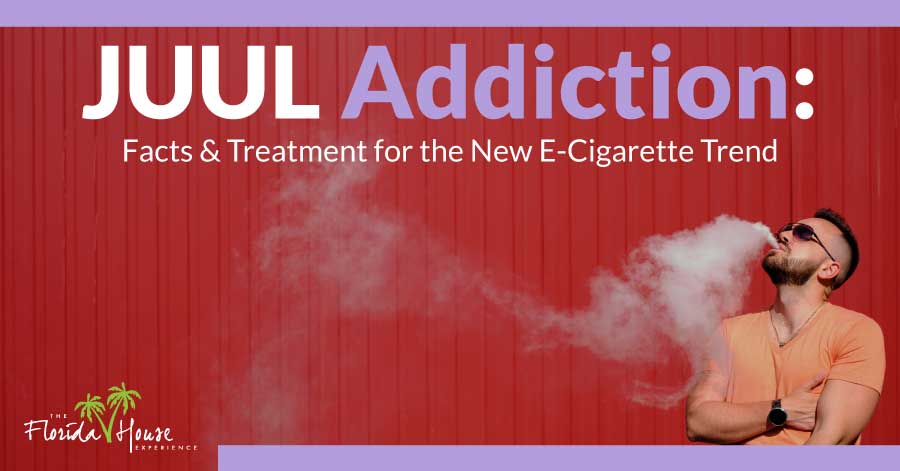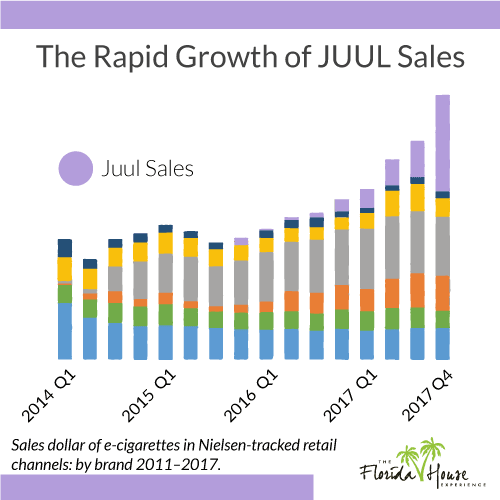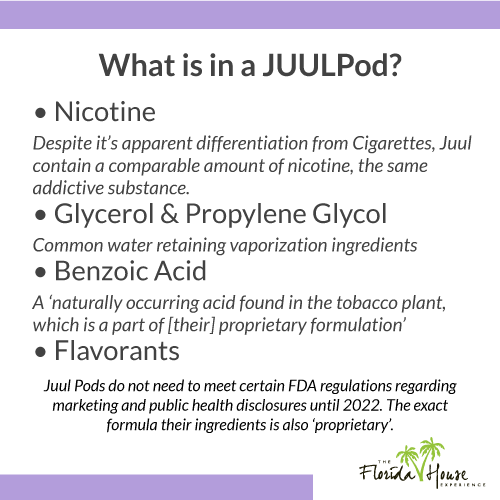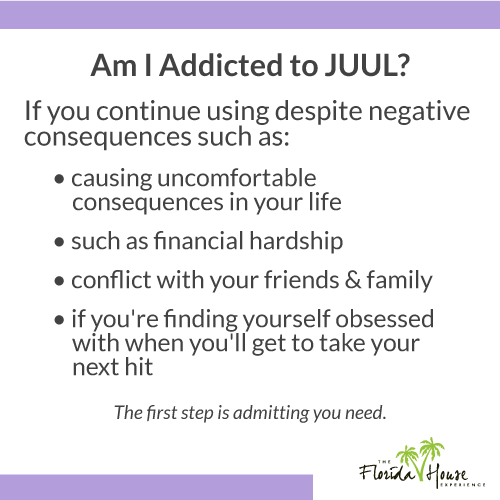
Updated April 8, 2019
What Exactly Is JUUL, and Why Is It So Popular?
With the ongoing shift away from inhaled tobacco products both here in the United States and throughout other Western countries has come a surge in a new nicotine delivery device: the e-cigarette.
JUUL has rapidly risen from being a San Francisco start-up to its current status as a global company valued at $15 billion USD, thanks largely to a slick, aggressive marketing campaign and its use of a patented — and exceptionally potent — proprietary flavored e-juice formula.
 The JUUL device is touted as being the “iPhone of E-cigs” by Men’s Journal. TechCrunch calls it “an extremely attractive and compact little device that packs the same amount of nicotine as a pack of cigarettes into a tiny liquid-nicotine cartridge” by using nicotine salts extracted from leaf tobacco. According to company co-founder James Monsees, “We set out to make a vastly superior product until there is no point in smoking cigarettes anymore” by designing a product that “delivered the familiar rush you’d get from a traditional cigarette but without the smoke, tar and ash.”
The JUUL device is touted as being the “iPhone of E-cigs” by Men’s Journal. TechCrunch calls it “an extremely attractive and compact little device that packs the same amount of nicotine as a pack of cigarettes into a tiny liquid-nicotine cartridge” by using nicotine salts extracted from leaf tobacco. According to company co-founder James Monsees, “We set out to make a vastly superior product until there is no point in smoking cigarettes anymore” by designing a product that “delivered the familiar rush you’d get from a traditional cigarette but without the smoke, tar and ash.”
Experts warn that JUUL may be putting a new generation of young people at risk of developing nicotine addiction while giving current smokers the false impression that switching from cigarettes to JUUL is a healthy alternative.
Although JUUL company reps have responded to mounting pressure to reduce the product appeal for youth by closing JUUL’s social media accounts and reducing the distribution of its flavored nicotine pods through convenience stores, JUUL makes no bones about the fact that they are actively targeting current smokers. In fact, the JUUL corporate mission is to “improve the lives of the world’s one billion adult smokers.” It’s a statement that many experts interpret as exploitation of those who are already addicted to nicotine.
What’s in a JUUL Cartridge?
 Each JUUL cartridge is marketed by the manufacturer as containing the equivalent of a standard pack of cigarettes, producing approximately 200 puffs or “hits.”
Each JUUL cartridge is marketed by the manufacturer as containing the equivalent of a standard pack of cigarettes, producing approximately 200 puffs or “hits.”
A recent survey of more than 40,000 young people by researchers at the University of Michigan’s Institute for Social Research revealed that the majority of adolescent e-cigarette users didn’t realize they were vaping a drug (nicotine) — they believed they were simply vaping a flavored fluid.
Development of a nicotine addiction at a young age has been linked to a host of health problems ranging from impaired brain development to altered nerve functioning. That means young JUUL users risk suffering from life-altering consequences that can’t be reversed.
What Makes JUUL So Addictive?
JUUL, along with other e-cigarette products, is highly addictive because it contains nicotine, a drug that’s been ranked as being just as addictive as heroin.
According to the University of California San Francisco, vaping nicotine “[releases] the pleasure chemical dopamine and other neurotransmitters in the brain within minutes of the first puff,” leading users to get hooked very quickly. As with all forms of inhaled nicotine, using JUUL causes measurable changes inside of your brain within moments of taking a hit. The effects are fast and intense.
And just like with heroin, nicotine withdrawal involves a host of unpleasant symptoms that develop within 24 hours of taking your last pull on your JUUL device. For some users, the onset of withdrawal symptoms can come on even faster. People who go “cold turkey” off JUUL may experience moderate to severe anxiety, depression, sleep and mood disturbances, and even anger. They’re all symptoms that make continued use more appealing to many than quitting.
Unlike other drugs like cocaine, opioids or alcohol, nicotine addiction tends to often be dismissed as simply a “habit.” However, the reality is that addiction to JUUL and other products containing nicotine can cause similar physical, behavioral and emotional impacts.
What to Do If You’re Addicted to JUUL
As with any form of addiction, the first step in dealing with your problem is recognizing the fact that you need help.
 Once you’ve reached the point where you’ve developed strong cravings for JUUL or lost control over how often you use it, it’s time to admit that you’re addicted. If you keep using JUUL in spite of the fact that it’s causing uncomfortable consequences in your life such as financial hardship or conflict with your friends and family, or if you’re finding yourself obsessed with when you’ll get to take your next hit, you need help.
Once you’ve reached the point where you’ve developed strong cravings for JUUL or lost control over how often you use it, it’s time to admit that you’re addicted. If you keep using JUUL in spite of the fact that it’s causing uncomfortable consequences in your life such as financial hardship or conflict with your friends and family, or if you’re finding yourself obsessed with when you’ll get to take your next hit, you need help.
Your family doctor can be a good resource for finding support with your JUUL addiction.
You may also want to look into a smoking cessation program through your local hospital, workplace or school since the addictive ingredient in JUUL is nicotine — the same thing that makes cigarettes addictive.
Dual Diagnosis or When Another Addiction Is Causing Your Problems With JUUL
Remember, nicotine addiction is closely linked to mental health issues such as anxiety and depression, and you may be using JUUL in an attempt to self-medicate symptoms stemming from one or more conditions that impact your mental wellness. This is known as a dual diagnosis— having both a substance abuse problem and a mental health issue, and it’s much more common than you might expect. If you have reason to believe that you may have a dual diagnosis, calling an addiction treatment center may be a good next step.
This may also be true if you have another substance abuse problem that is disrupting your life and feeding your JUUL addiction. If you have another substance abuse problem that may be contributing to compulsive use of JUUL, FHE Health can help. Our team of compassionate behavioral health experts uses innovative, science-based treatments to help you get well. Call us anytime— we’re available 24 hours a day, 365 days a year to answer your questions about our wide range of cutting-edge programs for youth, first responders, seniors and professionals.






